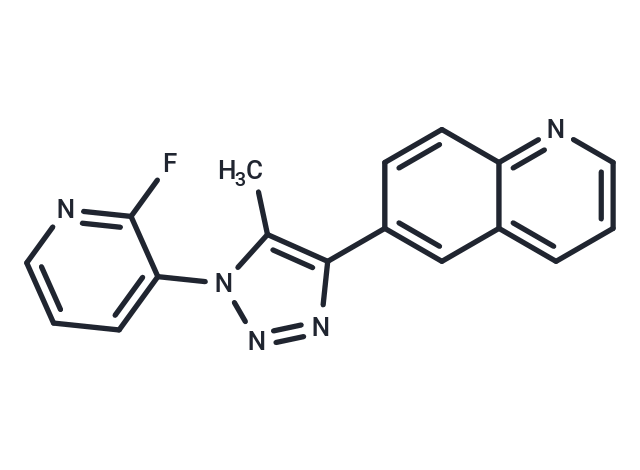
FPTQ B
CAS No. 864863-72-9
FPTQ B( —— )
Catalog No. M35294 CAS No. 864863-72-9
FPTQ is a highly effective antagonist of mGluR 1, displaying IC50 values of 6 nM and 1.4 nM for human and mouse mGluR1 respectively . In addition to its robust inhibitory properties, FPTQ exhibits notable antioxidant and anti-inflammatory effects in both in vitro and in vivo settings .
Purity : >98% (HPLC)
 COA
COA
 Datasheet
Datasheet
 HNMR
HNMR
 HPLC
HPLC
 MSDS
MSDS
 Handing Instructions
Handing Instructions
| Size | Price / USD | Stock | Quantity |
| 2MG | 70 | Get Quote |


|
| 5MG | 107 | Get Quote |


|
| 10MG | 155 | Get Quote |


|
| 25MG | 301 | Get Quote |


|
| 50MG | 407 | Get Quote |


|
| 100MG | 527 | Get Quote |


|
| 500MG | Get Quote | Get Quote |


|
| 1G | Get Quote | Get Quote |


|
Biological Information
-
Product NameFPTQ B
-
NoteResearch use only, not for human use.
-
Brief DescriptionFPTQ is a highly effective antagonist of mGluR 1, displaying IC50 values of 6 nM and 1.4 nM for human and mouse mGluR1 respectively . In addition to its robust inhibitory properties, FPTQ exhibits notable antioxidant and anti-inflammatory effects in both in vitro and in vivo settings .
-
DescriptionFPTQ is potent mGluR1 antagonist with IC50 values of 6 nM and 1.4 nM for human and mouse mGluR1 respectively. FPTQ has anti-oxidant and anti-inflammatory effects in vitro and in vivo.
-
In VitroFPTQ (0.5-10 μM) does not shows any cytotoxicity was not observed at 0.5, 1, 5, and 10 μM in RAW264.7 macrophage cells.FPTQ (1-20 μM; 24 hours) reduces LPS-induced NO production at > 1 μM FPTQ, and at 10 μM, FPTQ treatment causes a 31% anti-oxidant effect in RAW264.7 macrophage cells.FPTQ (1-20 μM; 24 hours) dramaticly decreases LPS-induced expression levels of IL-1β and Il-6. At a concentration of 10 μM, FPTQ causes a 27% and 44% reduction in the mRNA expression of IL-1β and Il-6, respectively in RAW264.7 macrophage cells.RT-PCR Cell Line:RAW264.7 macrophage cells Concentration:1, 10, or 20 μM Incubation Time:24 hours Result:Decreased IL-1β and IL-6 mRNA expression
-
In VivoFPTQ (5-20 μM) decreases the number of neutrophils migrating to the amputation site in zebrafish larvae by tail amputation. In the tailfin wound method, the number of neutrophils collecting at the wound site also decreases in a dose-dependent manner in zebrafish.In a LPS-induced inflammation zebrafish model, LPS solution is injected into the yolks of Tg(mpx:EGFP)i114 zebrafish larvae and exposed the zebrafish larvae immediately to FPTQ treatment.FPTQ (20 μM; 4 hours) significantly decreases the fluorescent neutrophils after yolk injection and has an anti-inflammatory effect during the early phase of inflammation.
-
Synonyms——
-
PathwayNeuroscience
-
TargetGluR
-
RecptorGluR
-
Research Area——
-
Indication——
Chemical Information
-
CAS Number864863-72-9
-
Formula Weight305.31
-
Molecular FormulaC17H12FN5
-
Purity>98% (HPLC)
-
SolubilityIn Vitro:?DMSO : 33.33 mg/mL (109.17 mM; Ultrasonic )
-
SMILESCc1c(nnn1-c1cccnc1F)-c1ccc2ncccc2c1
-
Chemical Name——
Shipping & Storage Information
-
Storage(-20℃)
-
ShippingWith Ice Pack
-
Stability≥ 2 years
Reference
1. Fujinaga M et al. Synthesis and evaluation of 6-[1-(2-[(18)F]fluoro-3-pyridyl)-5-methyl-1H-1,2,3-triazol-4-yl]quinoline for positron emission tomography imaging of the metabotropic glutamate receptor type 1 in brain. Bioorg Med Chem, 2011 Jan 1, 19(1):102?
molnova catalog



related products
-
Chelidamic acid
Chelidamic acid is a heterocyclic organic acid with a pyran skeleton. Chelidamic acid is inhibitors of glutamate decarboxylase with a Ki of 33 μM.
-
DMeOB
DMeOB (3,3'-Dimethoxybenzaldazine) is a negative regulator with mGluR5 agonist activity and can be used to study neurological diseases.
-
KM02894
KM02894 is a glutamate release inhibitor. Cancer cells release high levels of glutamate that can disrupt normal bone turnover, which can lead to cancer-induced bone pain.KM02894 may be used in the study of tumor-related diseases.



 Cart
Cart
 sales@molnova.com
sales@molnova.com


